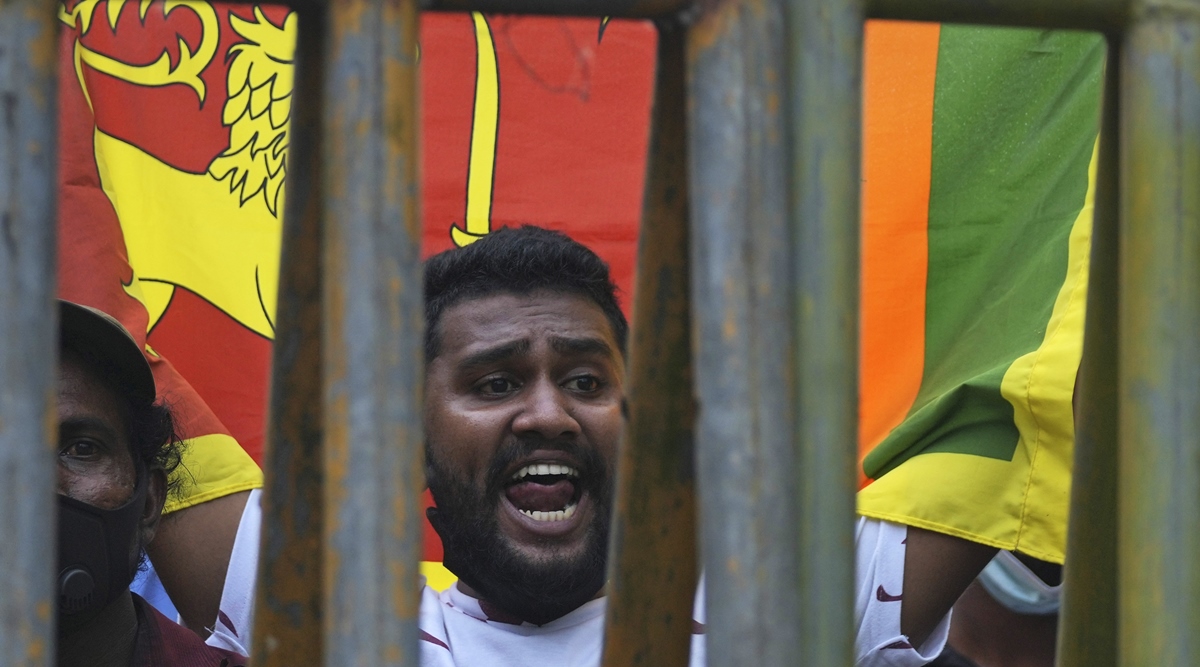 A Sri Lankan protests demanding president Gotabaya Rajapaksa resign, in Colombo, Sri Lanka, April 5, 2022. (AP)
A Sri Lankan protests demanding president Gotabaya Rajapaksa resign, in Colombo, Sri Lanka, April 5, 2022. (AP) For the past week, Sri Lanka has been roiling under violent protests as anger over the government’s handling of the island’s economic crisis boiled over to the streets. Since then, much has happened. President Gotabaya Rajapaksa issued a 36-hour curfew which many protestors defied. He then imposed a national emergency, which was criticised by the public and the Opposition lawmakers, before the President revoked it earlier today.
Critics say the roots of the crisis, the worst in several decades, lie in economic mismanagement by successive governments that created and sustained a twin deficit – a budget shortfall alongside a current account deficit. Foreign exchange reserves have fallen by 70% in the past two years and were down to a paltry $2.31 billion as of February, leaving Sri Lanka struggling to import essentials, including food and fuel.
Here is a look at what is happening in India’s south-eastern neighbour.
Swathes of Sri Lanka faced prolonged power cuts for the past month as a deepening economic crisis roiled markets and buffeted businesses, with the government unable to pay for fuel shipments because of a foreign exchange shortage, an official said. Reeling under its worst economic crisis, Sri Lanka on March 1 announced nationwide seven-and-a-half hour daily power cuts. This is the longest power cut announced in Sri Lanka in 26 years, according to the news agency AFP. The country has been imposing sporadic power cuts amid its dwindling fuel supplies.
The current crisis was accelerated by deep tax cuts promised by Rajapaksa during a 2019 election campaign that were enacted months before the Covid-19 pandemic, which wiped out parts of Sri Lanka’s economy. With the country’s lucrative tourism industry and foreign workers’ remittances sapped by the pandemic, credit ratings agencies moved to downgrade Sri Lanka and effectively locked it out of international capital markets.
Why the anger against the Rajapaksa clan?
The Rajapaksa family, whose members include Sri Lanka’s Prime Minister and President, hails from Hambantota district in the south. President Gotabaya Rajapaksa and his brothers Chamal, PM Mahinda, and Basil are third-generation politicians, while the fourth generation is represented by Mahinda and Chamal’s sons Namal, Yositha and Shashindra. In South Asia, no other political dynasty has been as confidently nepotistic.
What did the Cabinet of Ministers resign?
Sri Lanka’s Cabinet of Ministers resigned with immediate effect late on April 3 night, as the country experiences its worst economic crisis of all time. Speaking to reporters, Education Minister and Leader of the House, Dinesh Gunawardena said the Cabinet Ministers handed over their resignations to Prime Minister Mahinda Rajapaksa. He proffered no reason for the mass resignation. However, political experts said the ministers came under intense pressure from the public over the government’s alleged “mishandling” of the economic crisis, triggered by the shortage in the foreign exchange reserve.
Embassies shut: what does this mean?
Cash-strapped Sri Lanka has decided to temporarily shut its embassies in Norway and Iraq, as well as the country’s Consulate General in Sydney, the Ministry of Foreign Affairs said on Tuesday. A statement from the ministry said the decision will take effect from April 30. The Ministry said the decision of temporary closure of the two embassies and a consulate by the government came after careful deliberation and was part of a general restructuring of Sri Lanka’s diplomatic representation overseas.
Explained: Emergency in Sri Lanka, its history and contours
Sri Lanka’s President Gotabaya Rajapaksa declared an Emergency on April 1 as thousands of people came out on the streets to protest the crippling power cuts and shortages of essential commodities caused by the country’s economic meltdown. This is the second time within a year that Rajapaksa has resorted to this measure — he declared an Emergency on August 30 last year to deal with the hoarding of essential commodities when the economic crisis had begun to manifest itself in all its severity but lifted it within a few weeks.
- The Indian Express website has been rated GREEN for its credibility and trustworthiness by Newsguard, a global service that rates news sources for their journalistic standards.

